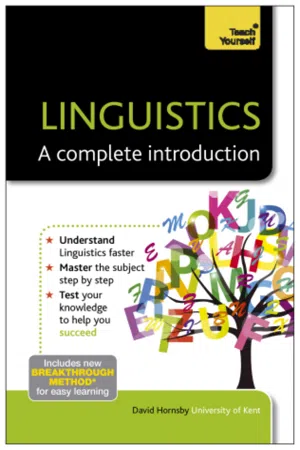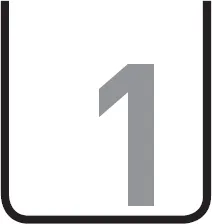
eBook - ePub
Linguistics: A Complete Introduction: Teach Yourself
David Hornsby
This is a test
- 256 Seiten
- English
- ePUB (handyfreundlich)
- Über iOS und Android verfügbar
eBook - ePub
Linguistics: A Complete Introduction: Teach Yourself
David Hornsby
Angaben zum Buch
Buchvorschau
Inhaltsverzeichnis
Quellenangaben
Über dieses Buch
Written by David Hornsby, who is a current Linguistics lecturer and researcher at the
University of Kent, Linguistics - The Essentials is designed to give you everything you need to succeed, all in one place. It covers the key areas that students are expected to be confident in, outlining the basics in clear jargon-free English, and then providing added value features like summaries of key books, and even lists of questions you might be asked in your seminar or exam.
The book uses a structure that mirrors many university courses on linguistics - with
separate chapters focusing on linguistic thought, syntax, sound systems, morphology,
semantics, pragmatics, language acquisition, and much more.
Häufig gestellte Fragen
Wie kann ich mein Abo kündigen?
Gehe einfach zum Kontobereich in den Einstellungen und klicke auf „Abo kündigen“ – ganz einfach. Nachdem du gekündigt hast, bleibt deine Mitgliedschaft für den verbleibenden Abozeitraum, den du bereits bezahlt hast, aktiv. Mehr Informationen hier.
(Wie) Kann ich Bücher herunterladen?
Derzeit stehen all unsere auf Mobilgeräte reagierenden ePub-Bücher zum Download über die App zur Verfügung. Die meisten unserer PDFs stehen ebenfalls zum Download bereit; wir arbeiten daran, auch die übrigen PDFs zum Download anzubieten, bei denen dies aktuell noch nicht möglich ist. Weitere Informationen hier.
Welcher Unterschied besteht bei den Preisen zwischen den Aboplänen?
Mit beiden Aboplänen erhältst du vollen Zugang zur Bibliothek und allen Funktionen von Perlego. Die einzigen Unterschiede bestehen im Preis und dem Abozeitraum: Mit dem Jahresabo sparst du auf 12 Monate gerechnet im Vergleich zum Monatsabo rund 30 %.
Was ist Perlego?
Wir sind ein Online-Abodienst für Lehrbücher, bei dem du für weniger als den Preis eines einzelnen Buches pro Monat Zugang zu einer ganzen Online-Bibliothek erhältst. Mit über 1 Million Büchern zu über 1.000 verschiedenen Themen haben wir bestimmt alles, was du brauchst! Weitere Informationen hier.
Unterstützt Perlego Text-zu-Sprache?
Achte auf das Symbol zum Vorlesen in deinem nächsten Buch, um zu sehen, ob du es dir auch anhören kannst. Bei diesem Tool wird dir Text laut vorgelesen, wobei der Text beim Vorlesen auch grafisch hervorgehoben wird. Du kannst das Vorlesen jederzeit anhalten, beschleunigen und verlangsamen. Weitere Informationen hier.
Ist Linguistics: A Complete Introduction: Teach Yourself als Online-PDF/ePub verfügbar?
Ja, du hast Zugang zu Linguistics: A Complete Introduction: Teach Yourself von David Hornsby im PDF- und/oder ePub-Format sowie zu anderen beliebten Büchern aus Languages & Linguistics & Linguistics. Aus unserem Katalog stehen dir über 1 Million Bücher zur Verfügung.
Information
Thema
Linguistics
Thinking like a linguist

Our tasks in this chapter will be to explain what it means to ‘think like a linguist’ and to show how linguists’ assumptions about language often differ from those of the layperson. One might assume, for example, that a linguist would be the first person to turn to when seeking advice on good speech or writing. In fact, few linguists would see it as part of their role to prescribe how language should be used, preferring instead to describe the facts of language as it is used. As we will see later in the chapter, linguists are quick to point out that the bases for our linguistic value judgements generally turn out to be arbitrary, spurious and inconsistent.
In literate societies, we are also used to equating language with its written form, and treating speech as somehow deviant. Linguists make precisely the opposite assumption, reminding us that we all learn our mother tongue at a very young age without the aid of books, and if we learn to read and write in that language at all, we do so only after we have mastered speech. As we will see in this chapter, language looks radically different when we start from a spoken language perspective. It will also become clear that some everyday assumptions we take for granted – for example, the difference between a language and a dialect, or the notion of ‘beautiful’ or ‘primitive’ languages – become highly problematical once our linguistic prejudices are stripped away.

The science of language
It makes sense to start by asking what the term linguistics actually means. The following definition is taken from Collins English Dictionary:
‘Linguistics, n. (functioning as sing.) The scientific study of language’
As a working definition, ‘scientific study of language’ will probably do, but the word ‘scientific’ might appear problematic in this context, because language doesn’t seem to belong to the realm of science in its conventional sense. One certainly doesn’t imagine linguists in laboratories wearing white coats, and it isn’t immediately obvious how one could undertake experiments on language, something that resides ultimately in the head of a native speaker.
It might help if we construe ‘scientific’ here to mean something like ‘objective’, but achieving ‘objectivity’ in linguistics is far from a straightforward task, not least because speakers’ judgements about the same data can differ hugely, making reliable conclusions difficult to draw. For example, while most British English speakers would probably reject the sentence ‘I didn’t do it though but’, it’s perfectly acceptable in some British dialects. Likewise, many English speakers accept ‘innit?’ as a contraction of ‘isn't it?’ but reject it (often vehemently) as a tag question in sentences like: ‘We’re seeing him on Saturday, innit?’ – now commonly used in some varieties of British English. Even for a question as apparently innocuous as ‘Do you speak language X?’, native speaker intuitions may be contradictory or difficult to interpret: responses may be influenced by informants’ attitudes to the language in question (‘Do I approve of X, or even think of it as a proper language? Would I want people to think I use it?’) or to their understanding of the question, which might range from: ‘Do I speak this language every day?’ to ‘Can I understand it, even if I don’t speak it?’, or even ‘Can I manage a few words if the need arises?’ So linguists need to be especially careful when claiming ‘scientific’ objectivity for their findings.
To approach their subject matter objectively, linguists need first to shed a number of everyday assumptions, or ‘language myths’: we’ll be looking at some of these below. The good news is that learning to think like a linguist isn’t difficult: in a real sense, it’s a bit like releasing your inner child, as we’ll see in the next section. A further piece of good news is that, as a native speaker of any language, you’re already in possession of some ‘expert knowledge’! But before you start, you need to grasp two fundamental principles that underpin everything linguists do and that go some way to explaining what ‘scientific’ means for the study of language:
• Principle 1: ‘The spoken language comes first.’
• Principle 2: ‘Linguistics is descriptive, not prescriptive.’
Principle 1: The spoken language comes first
As we saw, thinking as a linguist does is like ‘releasing your inner child’. The following thought experiment will help get you started.
 | Spotlight: Try to forget you can read |
Imagine what your world would be like if the written word were completely alien to you, and letters on the page no more than meaningless squiggles. Since you’re already reading this book, you’re probably finding that quite difficult, but this is of course a world you once knew, albeit when you were rather younger, probably before you started school.

For most adults, the written word takes up a significant proportion of our lives, whether we be reading a novel or daily newspaper, consulting an instruction manual, updating our Facebook status, catching up with the latest Twitter feed or texting a friend. If you’re at university or college, the written word soon becomes a prime focus: you read for a degree, which may well involve writing notes at lectures, where you may be given handouts, and you’ll be asked periodically to commit your thoughts to paper in the form of written essays. Writing is all around us, and modern life and the technological advances we take for granted would be impossible without it.
For linguists, however, writing takes second place to speech. Linguists are not uninterested in the written word: indeed, written material, particularly from earlier, pre-mass media eras, can offer important clues to language structure and linguistic change. Linguists working in the field of literary stylistics devote much of their time to the analysis of written texts. But generally linguists follow the principle of according primacy to speech, for a number of very good reasons:
1 All the world’s existing and extinct natural languages have had native speakers, but only a minority of them have ever had a written form.
While languages such as English, Mandarin, Hindi or Russian all have a long written tradition, many others, particularly those with small numbers of speakers, do not. Many African languages (e.g. Ewe, Wawa, Lugbara), Australian aboriginal languages (e.g. Dyirbal, Warlbiri, Guugu Yimidhirr) and native American languages (e.g. Arawakan, Hopi, Miskito) are not generally used for writing. We know little of the Gaulish language, which was spoken in what is now France before Roman occupation, because Gauls had no written system, and much of what we do know about the language comes from attempts to transcribe it using Latin characters, which were not designed for Gaulish.
Speakers of minority languages in unsympathetic nation states have often been taught that writing is acceptable only in the dominant or ‘official’ language, making it harder for their supporters to develop an accepted written standard if and when those same states later adopt more tolerant attitudes.
Cockney, Brummie, Geordie and Glaswegian (see Case study on next page) have no written form and their speakers are dependent on the conventions of standard English for writing. Estimates put at around 6,000 the number of different languages spoken throughout the world, of which only a fraction have a written form: it would seem perverse – not to say ‘u...
Inhaltsverzeichnis
- Cover
- Title
- Dedication
- Contents
- About the author
- Acknowledgements
- Preface
- How to use this book
- 1 Thinking like a linguist
- 2 A brief history of linguistic thought
- 3 Structural linguistics
- 4 The building blocks of language: describing speech sounds
- 5 Laying the foundations: sound systems in language
- 6 Building words: morphology
- 7 A grammar of sentences: syntax
- 8 The Chomskyan revolution: generative grammar
- 9 Semantics: the meaning of ‘meaning’
- 10 Pragmatics: saying what you mean
- 11 Exploring variation in language
- 12 Choosing your language: multilingualism and language planning
- 13 Mechanisms of language change
- Copyright
Zitierstile für Linguistics: A Complete Introduction: Teach Yourself
APA 6 Citation
Hornsby, D. (2014). Linguistics: A Complete Introduction: Teach Yourself ([edition unavailable]). John Murray Press. Retrieved from https://www.perlego.com/book/3179636/linguistics-a-complete-introduction-teach-yourself-pdf (Original work published 2014)
Chicago Citation
Hornsby, David. (2014) 2014. Linguistics: A Complete Introduction: Teach Yourself. [Edition unavailable]. John Murray Press. https://www.perlego.com/book/3179636/linguistics-a-complete-introduction-teach-yourself-pdf.
Harvard Citation
Hornsby, D. (2014) Linguistics: A Complete Introduction: Teach Yourself. [edition unavailable]. John Murray Press. Available at: https://www.perlego.com/book/3179636/linguistics-a-complete-introduction-teach-yourself-pdf (Accessed: 15 October 2022).
MLA 7 Citation
Hornsby, David. Linguistics: A Complete Introduction: Teach Yourself. [edition unavailable]. John Murray Press, 2014. Web. 15 Oct. 2022.